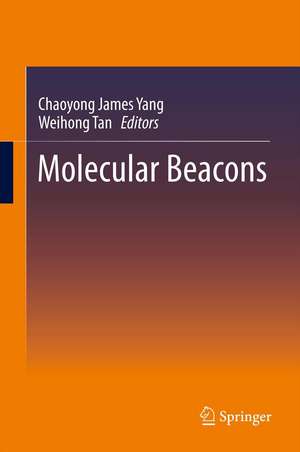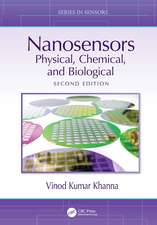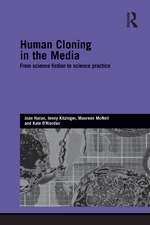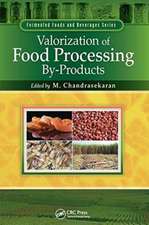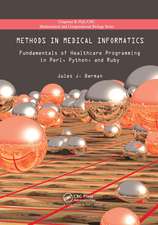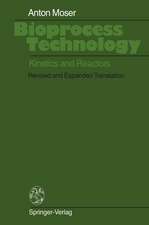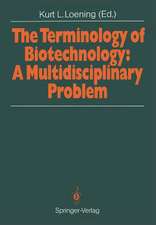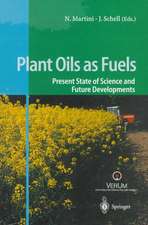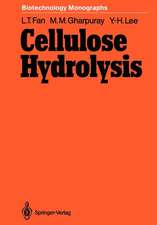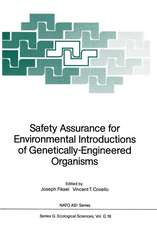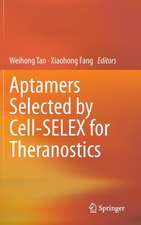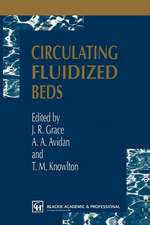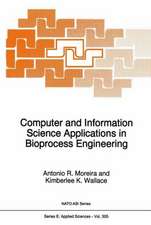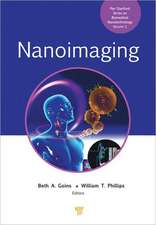Molecular Beacons
Editat de Chaoyong James Yang, Weihong Tanen Limba Engleză Hardback – 26 aug 2013
This book is designed to bring together in a single resource an organized and comprehensive view of molecular beacons and will be a valuable resource for academic, clinical and industrial scientists and graduate students who may consider exploring molecular beacons in their research or practice.
Chaoyong James Yang is the Lu Jiaxi Professor of Chemistry at Xiamen University, China.
Weihong Tan is a Distinguished Professor of Chemistry and Biomedical Engineering at Hunan University, China and also a University of Florida Distinguished Professor and V. T. and Louis Jackson Professor of Chemistry at the University of Florida, USA.
| Toate formatele și edițiile | Preț | Express |
|---|---|---|
| Paperback (1) | 635.96 lei 6-8 săpt. | |
| Springer Berlin, Heidelberg – 23 aug 2016 | 635.96 lei 6-8 săpt. | |
| Hardback (1) | 643.34 lei 6-8 săpt. | |
| Springer Berlin, Heidelberg – 26 aug 2013 | 643.34 lei 6-8 săpt. |
Preț: 643.34 lei
Preț vechi: 756.86 lei
-15% Nou
Puncte Express: 965
Preț estimativ în valută:
123.12€ • 128.06$ • 101.64£
123.12€ • 128.06$ • 101.64£
Carte tipărită la comandă
Livrare economică 14-28 aprilie
Preluare comenzi: 021 569.72.76
Specificații
ISBN-13: 9783642391088
ISBN-10: 3642391087
Pagini: 200
Ilustrații: IX, 194 p. 88 illus., 70 illus. in color.
Dimensiuni: 155 x 235 x 15 mm
Greutate: 0.5 kg
Ediția:2013
Editura: Springer Berlin, Heidelberg
Colecția Springer
Locul publicării:Berlin, Heidelberg, Germany
ISBN-10: 3642391087
Pagini: 200
Ilustrații: IX, 194 p. 88 illus., 70 illus. in color.
Dimensiuni: 155 x 235 x 15 mm
Greutate: 0.5 kg
Ediția:2013
Editura: Springer Berlin, Heidelberg
Colecția Springer
Locul publicării:Berlin, Heidelberg, Germany
Public țintă
ResearchCuprins
Design, Synthesis, Purification and Characterization of Molecular Beacons.- Thermodynamic and Kinetic Properties of Molecular Beacons.- Application of Molecular Beacons in Real-Time PCR.- Molecular Beacons for Detection of Single Nucleotide Polymorphisms.- Molecular Beacons on Solid Surfaces.- Functional materials for signal amplification of molecular beacons.- Engineering Molecular Beacons for Advanced Applications.- Excimer Molecular Beacon.- Strategies for Delivering Molecular Beacons into Cells.- Molecular Beacons for Intracellular Analysis: Challenges and Successes.- Molecular Aptamer Beacons.
Notă biografică
Professor Chaoyong James Yang received his PhD from the University of Florida in 2006 under the supervision of Professor Weihong Tan. After completing his Ph.D. dissertation on molecular engineering of DNA probes for intracellular imaging, he joined Professor Richard Mathies’ group as a postdoctoral researcher at the University of California, Berkeley and worked on the development of microfluidic approaches for next generation DNA sequencing. In 2008, he became a faculty member of Xiamen University and now is the Lu Jiaxi Professor of Chemistry in the Department of Chemical Biology at Xiamen University. He won the Chinese Government Award for Outstanding Students Abroad in 2005 and received a DAC Graduate Fellowship from the American Chemical Society in 2005 and Distinguished Faculty Award from the Chinese-American Chemistry & Chemical Biology Professors’ Association in 2012. His current research is particularly focused on molecular engineering, high throughput evolution, and microfluidics.
Prof. Weihong Tan received a Ph.D. in physical chemistry from the University of Michigan, Ann Arbor in 1993. He was then named a Distinguished Postdoctoral Researcher by the US-DOE and worked at the Ames Laboratory. In 1996, he joined the University of Florida as an assistant professor of chemistry, and was promoted to associate professor (2001), full professor (2003) and distinguished professor (2012). He was named a University of Florida Research Foundation Professor (2004), and V. T and Louis Jackson Endowed Professor (2008 till now). Prof. Tan is also a professor of biomedical engineering and chemistry at Hunan University. He is the Director of State Key Laboratory of Chemo/Bio-Sensing and Chemometrics. Tan’s group has developed research programs in bioanalysis, chemical biology, bionanotechnology, and biomedical engineering. Currently, the Tan group is working on synthesizing a variety of DNA probes for biomedical studies and for DNA nanomotors, indeveloping new nanomaterials and bionanotechnology for bioanalysis, molecular imaging and drug delivery, and in elucidating the molecular basis of diseases such as cancer using a chemical biology approach. His work has been recognized by many awards, including the Pittcon Achievement Award in 2004 and the ACS Florida Award in 2012 for outstanding contributions to chemical sciences. Prof. Tan has published extensively in the field of bioanalysis, chemical biology and bionanotechnology with more than 330 papers with an H-index of 68 and more than 16,000 citations.
Prof. Weihong Tan received a Ph.D. in physical chemistry from the University of Michigan, Ann Arbor in 1993. He was then named a Distinguished Postdoctoral Researcher by the US-DOE and worked at the Ames Laboratory. In 1996, he joined the University of Florida as an assistant professor of chemistry, and was promoted to associate professor (2001), full professor (2003) and distinguished professor (2012). He was named a University of Florida Research Foundation Professor (2004), and V. T and Louis Jackson Endowed Professor (2008 till now). Prof. Tan is also a professor of biomedical engineering and chemistry at Hunan University. He is the Director of State Key Laboratory of Chemo/Bio-Sensing and Chemometrics. Tan’s group has developed research programs in bioanalysis, chemical biology, bionanotechnology, and biomedical engineering. Currently, the Tan group is working on synthesizing a variety of DNA probes for biomedical studies and for DNA nanomotors, indeveloping new nanomaterials and bionanotechnology for bioanalysis, molecular imaging and drug delivery, and in elucidating the molecular basis of diseases such as cancer using a chemical biology approach. His work has been recognized by many awards, including the Pittcon Achievement Award in 2004 and the ACS Florida Award in 2012 for outstanding contributions to chemical sciences. Prof. Tan has published extensively in the field of bioanalysis, chemical biology and bionanotechnology with more than 330 papers with an H-index of 68 and more than 16,000 citations.
Textul de pe ultima copertă
Molecular Beacons explains working principle of molecular beacons, discusses their design, synthesis, purification and characterization, explores their thermodynamic and kinetic properties, and more importantly, reviews their in vivo and in vitro applications with the emphasis on the design and modification of molecular beacons for in vivo mRNA imaging applications.
This book is designed to bring together in a single resource an organized and comprehensive view of molecular beacons and will be a valuable resource for academic, clinical and industrial scientists and graduate students who may consider exploring molecular beacons in their research or practice.
Chaoyong James Yang is the Lu Jiaxi Professor of Chemistry at Xiamen University, China.
Weihong Tan is a Distinguished Professor of Chemistry and Biomedical Engineering at Hunan University, China and also a University of Florida Distinguished Professor and V. T. and Louis Jackson Professor of Chemistry at the University of Florida, USA.
This book is designed to bring together in a single resource an organized and comprehensive view of molecular beacons and will be a valuable resource for academic, clinical and industrial scientists and graduate students who may consider exploring molecular beacons in their research or practice.
Chaoyong James Yang is the Lu Jiaxi Professor of Chemistry at Xiamen University, China.
Weihong Tan is a Distinguished Professor of Chemistry and Biomedical Engineering at Hunan University, China and also a University of Florida Distinguished Professor and V. T. and Louis Jackson Professor of Chemistry at the University of Florida, USA.
Caracteristici
Provides a comprehensive description of the fundamentals and applications of molecular beacons Addresses the technical aspects of molecular beacons Reviews in vivo and in vitro applications of molecular beacons Includes supplementary material: sn.pub/extras
